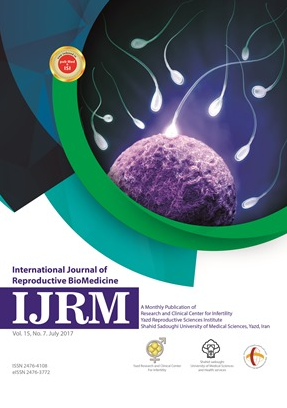
International Journal of Reproductive BioMedicine
ISSN: 2476-3772
The latest discoveries in all areas of reproduction and reproductive technology.
Correlation of anti-Müllerian hormone levels with metabolic syndrome events in polycystic ovary syndrome: A cross-sectional study
Published date: Apr 05 2020
Journal Title: International Journal of Reproductive BioMedicine
Issue title: International Journal of Reproductive BioMedicine (IJRM): Volume 18, Issue No. 3
Pages: 187–192
Authors:
Abstract:
Background: Various endocrine disorders have been reported in women of reproductive age, 10% of which is affected by polycystic ovary syndrome (PCOS).
Objective: This study aimed to evaluate the correlation of anti-Müllerian hormone (AMH) levels with the metabolic syndrome in patients with PCOS.
Materials and Methods: This cross-sectional study employed a consecutive sampling method using medical records from January 2013 to December 2017 at Dr. Cipto Mangunkusumo General Hospital polyclinic and Yasmin in vitro fertilization Clinic (Kencana), Jakarta, Indonesia. The primary outcome of the study was the AMH levels as independent variable correlated with metabolic syndrome. The secondary outcome was also the AMH levels correlated with each PCOS phenotype. The tertiary outcome was each PCOS phenotype as independent variable correlated with metabolic syndrome.
Results: Women with phenotype 1 of PCOS had a median AMH level of 13.92 (range: 3.88-34.06) ng/ml. 21% patients had metabolic syndrome, with a median AMH level 7.65 (3.77-20.20) ng/ml, higher than the women without metabolic syndrome (p = 0.38). The most frequent phenotype in women with PCOS was phenotype 4, oligo- or anovulation and polycystic ovary morphology (OA/PCOM) in 41.3%. The most frequent phenotype in women with metabolic syndrome was phenotype 1, OA + PCOM + hyperandrogenism in 56.5%.
Conclusion: All PCOS phenotypes exhibited significant correlations with the AMH level. Phenotype 1 (OA + PCOM + hyperandrogenism) was associated with the highest AMH level and was significantly associated with metabolic syndrome.
Key words: Anti-Müllerian hormone, Metabolic syndrome, Polycystic ovary syndrome.
References:
[1] Sirmans SM, Pate KA. Epidemiology, diagnosis, and management of polycystic ovary syndrome. Clin Epidemiol 2013; 6: 1–13.
[2] Dumont A, Robin G, Catteau-Jonard S, Dewailly D. Role of anti-mullerian hormone in pathophysiology, diagnosis, and treatment of polycystic ovary syndrome: A review. Reprod Biol Endocrinol 2015; 13: 137.
[3] Rotterdam ESHRE/ASRM-Sponsored PCOS Consensus Workshop Group. Revised 2003 consensus on diagnostic criteria and long-term health risks related to polycystic ovary syndrome. Fertil Steril 2004; 81: 19–25.
[4] Zahiri Z, Sharami SH, Milani F, Mohammadi F, Kazemnejad E, Ebrahimi H, et al. Metabolic syndrome in patients with polycystic ovary syndrome in Iran. Int J Fertil Steril 2016; 9: 490–496.
[5] Głuszak O, Stopińska-Głuszak U, Glinicki P, Kapuścińska R, Snochowska H, Zgliczyński W, et al. Phenotype and metabolic disorders in polycystic ovary syndrome. ISRN Endocrinol 2012; 2012: 569862.
[6] Park HR, Choi Y, Lee HJ, Oh JY, Hong YS, Sung YA. The metabolic syndrome in young Korean women with polycystic ovary syndrome. Diabetes Res Clin Pract 2007; 77 (Suppl.): S243–S246.
[7] Clark NM, Podolski AJ, Brooks ED, Chizen DR, Pierson RA, Lehotay DC, et al. Prevalence of polycystic ovary syndrome phenotypes using updated criteria for polycystic ovarian morphology: An assessment of over 100 consecutive women self-reporting features of polycystic ovary syndrome. Reprod Sci 2014; 21: 1034–1043.
[8] Crespo RP, Bachega TASS, Mendonça BB, Gomes LG. An update of genetic basis of PCOS pathogenesis. Arch Endocrinol Metab 2018; 62: 352–361.
[9] Carmina E, Napoli N, Longo RA, Rini GB, Lobo RA. Metabolic syndrome in polycystic ovary syndrome (PCOS): lower prevalence in southern Italy than in the USA and the influence of criteria for the diagnosis of PCOS. Eur J Endocrinol 2006; 154: 141–145.
[10] Pillai BP, Kumar H, Jayakumar RV, Alur VC, Sheejamol VS. The prevalence of metabolic syndrome in polycystic ovary syndrome in a South Indian population and the use of neck circumference in defining metabolic syndrome. Int J Diabetes Dev Ctries 2015; 35: 469–475.
[11] Wiweko B, Cynthia AS. Anti Mullerian hormone as a predictor of metabolic syndrome in polycystic ovary syndrome. Indones J Obstet Gynecol 2017; 5: 83–86.
[12] Lin YH, Chiu WC, Wu CH, Tzeng CR, Hsu CS, Hsu MI. Antimullerian hormone and polycystic ovary syndrome. Fertil Steril 2011; 96: 230–235.
[13] Li L, Chen X, He Z, Zhao X, Huang L, Yang D. Clinical and metabolic features of polycystic ovary syndrome among Chinese adolescents. J Pediatr Adolesc Gynecol 2012; 25: 390–395.
[14] Yarde F, Spiering W, Franx A, Visseren FL, Eijkemans MJ, de Valk HW, et al. Association between vascular health and ovarian ageing in type 1 diabetes mellitus. Hum Reprod 2016; 31: 1354–1362.
[15] Altintas KZ, Dilbaz B, Cirik DA, Ozelci R, Zengin T, Erginay ON, et al. The incidence of metabolic syndrome in adolescents with different phenotypes of PCOS. Ginekol Pol 2017; 88: 289–295.
[16] Shroff R, Syrop CH, Davis W, Van Voorhis BJ, Dokras A. Risk of metabolic complications in the new pcos phenotypes based on the rotterdam criteria. Fertil Steril 2007; 88: 1389–1395.
[17] Han TS, Lean ME. A clinical perspective of obesity, metabolic syndrome and cardiovascular disease. JRSM Cardiovasc Dis 2016; 5: 2048004016633371.
[18] Yarde F, Spiering W, Franx A, Visseren FL, Eijkemans MJ, de Valk HW, et al. Association between vascular health and ovarian ageing in type 1 diabetes mellitus. Hum Reprod 2016; 31: 1354–1362.